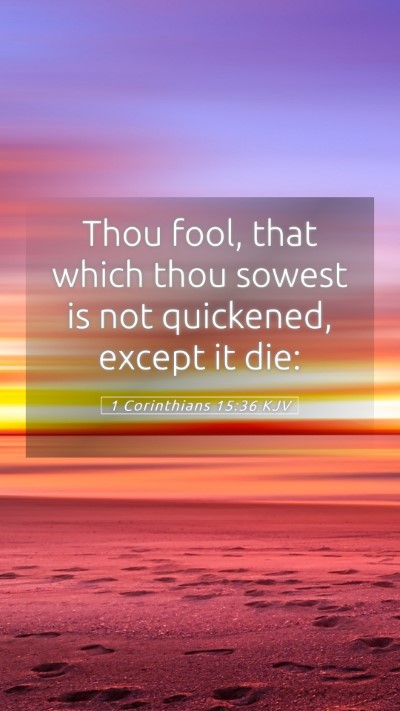Understanding 1 Corinthians 15:36
Verse Context: The Apostle Paul addresses the resurrection of the dead in this chapter, emphasizing the transformation that occurs from mortality to immortality. In 1 Corinthians 15:36, Paul poses a rhetorical question, stirring thought about the nature of resurrection.
Bible Verse Explanation
Paul's rhetorical question, "Foolish one, what you sow is not made alive unless it dies," conveys profound truth about spiritual and physical transformation. The reference to "sowing" serves as a metaphor for death and resurrection, akin to planting a seed which must die to yield new life. This verse highlights key themes in biblical exegesis related to resurrection and regeneration.
Key Themes and Insights
- Transformation: The passage reflects the transformational power of God, which allows for life to emerge from death. Matthew Henry notes that everything must undergo a process before it can fully realize its intended purpose.
- Faith and Resurrection: Adam Clarke emphasizes the assurance given to believers regarding resurrection, showcasing that physical death is not the end, but a transition to a new, eternal life in Christ.
- Natural vs Spiritual: Albert Barnes illustrates the distinction between natural bodies and spiritual bodies, reinforcing how the earthly experience must give way to a heavenly, glorified existence, echoing the principles of understanding Scripture in a robust theological framework.
Application to Daily Life
The principles derived from 1 Corinthians 15:36 not only bolster theological study but also offer vital insights for daily living. In understanding this scripture, believers can find hope in the face of mortality, knowing that life is both cyclical and redemptive.
Reflections from Public Domain Commentaries
Matthew Henry's Commentary
Henry elaborates on the necessity of understanding this verse within the broader context of resurrection, convincing believers that acceptance of death leads to spiritual renewal.
Albert Barnes' Notes
Barnes reiterates the importance of the 'dying' process as indispensable for creation to occur, underscoring that the resurrected body will be entirely different and glorified, a theme central to scripture analysis.
Adam Clarke's Commentary
Clarke brings to light the significance of the transformation process highlighted by Paul, contributing to a deeper understanding of how God's purposes are fulfilled through death and resurrection.
Cross References
- John 12:24: Jesus mentions the necessity of a grain of wheat dying to produce much fruit.
- Romans 6:5: Paul discusses the idea that sharing in Christ's death leads to sharing in His resurrection.
- Philippians 3:21: The transformation of our lowly bodies to be like His glorious body is reiterated.
Conclusion
In summary, 1 Corinthians 15:36 serves as a profound statement about life, death, and the divine promise of resurrection. Engaging with the verse through the lens of Bible verse interpretations enriches the believer’s understanding and appreciation of God’s plan for humanity.
Further Study Suggestions
If you are involved in bible study groups or interested in online Bible study, delve deeper into the topics surrounding resurrection through study guides that focus on bible study tools and bible study resources.


